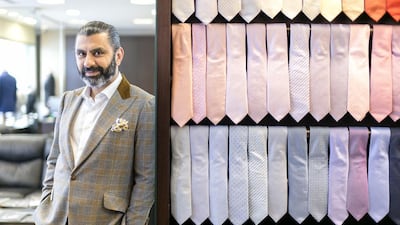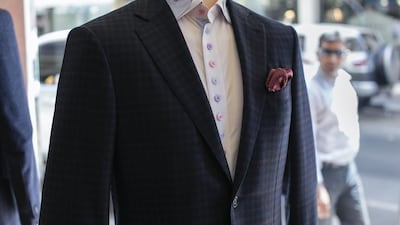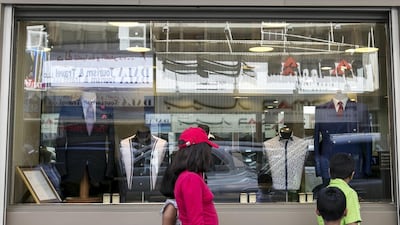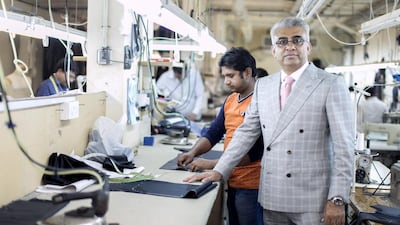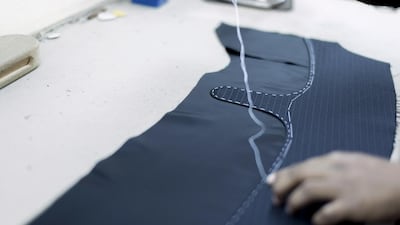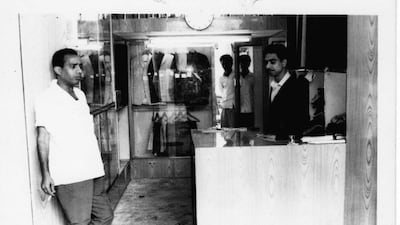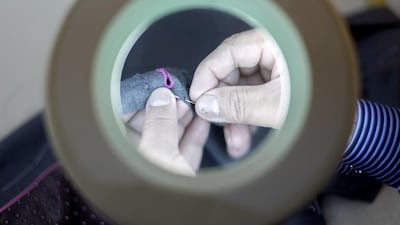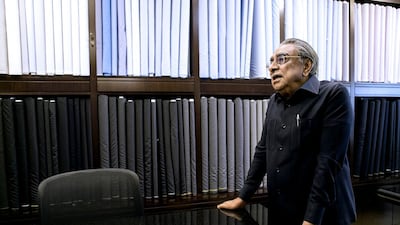When PN Parmar arrived in Dubai by dhow from India in 1956, there was no electricity, fresh water was delivered to homes by donkey and the local currency was the Indian Rupee.
Coming from a family of tailors in Mumbai, Mr Parmar, now 82, decided to set up his own tailor shop in Bur Dubai with the help of a small loan from a friend. Today, the original shop still stands, but the company has expanded to include a store in Jumeirah Lakes Towers and a Bespoke line in the Dubai International Financial Centre.
“In my first six days in Dubai, I was invited to dinner every night,” says Mr Parmar. “It was a time when everybody knew everybody. Life was simple, there were no street lamps and no running water.”
The first store was minimal, housing a table, some cloth and a place to change. With no electricity, all garments were hand-sewed, carried out under the light of a lantern at night. It took another six years before electric sewing machines came to the market.
The majority of Parmar Tailors’ clients were British, Iranian businessmen “and of course, the Sheikhs”.
In 1976, with 10 tailors, Mr Parmar relinquished the management of the business to focus on other projects. But when the company went “downhill”, he took back control, along with his son Prakash Parmar, 45, in 1984 when only two tailors remained.
“There was just the four of us, we created a ladies store and opened a store in Abu Dhabi, but eventually shut that down. In 2006, we created the Bespoke brand,” says Prakash Parmar, now the chief operating officer.
Today, Parmar Tailors employs around 140 staff; 90 are tailors with 25 of those working exclusively in the Bespoke business.
The growth of the business reflects how the men’s tailoring industry in Dubai has evolved in recent years. Gone are the days of commissioning a jacket and two pairs of trousers in Bur Dubai or Satwa. Since the late 1990s and early 2000s, there has been greater demand for more fashionable and personalised pieces — spurred on by the growing cultural diversity and presence of designer brands from the West.
“In the next four years, bespoke tailors see the market in Dubai maturing with a common vision of having spaces and sections of the city especially dedicated to bespoke tailoring and gentlemen’s lifestyle similar to that of Savile Row,” says Pawan Ishwar, who recently opened Knights and Lords in Dubai’s JBR.
Bespoke suits at Parmar’s are certainly inspired by Savile Row. A custom-made, handcrafted suit, for example, can take up to six days to produce and requires 6,000 hand stitches per jacket. Prices start at about Dh4,000 depending on the materials chosen. The tailors selected to work on the bespoke items need 10 to 12 years’ experience.
According to Euromonitor International, the menswear apparel industry in the UAE was worth $6.7 billion in 2014, with suits accounting for $381 million. By the end of this year, this is set to grow to $7.2bn before rising to $9.4bn in 2019 with suits accounting for $397m in 2015 and $463m by 2019.
The likes of Hugo Boss, Armani Exchange and Pierre Cardin have seen their market share grow steadily over the past five years, according to Diana Jarmalaite, an analyst at Euromonitor International.
“The boost of personal incomes and rising fashion consciousness and the link between personal outfits and business success, attracts men into the stores, especially those with international brands, which are often seen as synonymous with quality and fashion,” she adds.
This has had a ripple effect across the market boosting the bespoke tailoring market and also commissions in Satwa, traditionally the domain of women’s tailoring.
“We have more men now, they usually want us to make a copy of the suit they have,” says Shital Parmar, a tailor at Al Aryam Tailoring in Satwa. The area is traditionally considered the cheaper option for tailoring. Buy a men’s suit at Al Aryam Tailoring and you will be charged Dh270 for the labour with the material costing between Dh1,000 to Dh1,200.
But for men seeking something more high-end, the choices in the made-to-measure and bespoke sector are now more diverse.
“Before, tailoring was associated with the English and brands were not very strong here. In the past 15 years with the mall culture and the internet, people have had more exposure to different styles and they now know what they want,” adds Prakash Parmar.
business@thenational.ae
Follow The National's Business section on Twitter
